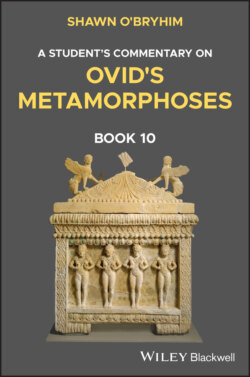Читать книгу A Student's Commentary on Ovid's Metamorphoses Book 10 - Shawn O'Bryhim - Страница 8
Introduction i. Ovid’s Biography
ОглавлениеMost of what we know about the Roman poet Publius Ovidius Naso comes from Tristia, a collection of autobiographical poems that he wrote after Augustus relegated him to the Black Sea. Because this information cannot be confirmed by independent sources, it must be used with caution, particularly when it comes to Ovid’s complaints about his place of exile.
At Tristia 4.10, Ovid says that he was born into a respectable equestrian family of moderate means on March 20, 43 BC, in Sulmo (modern Sulmona), a small city about 100 miles to the east of Rome. Ovid’s brother, who was born in the previous year, shared his birthday. Both were educated by the best local teachers. While Ovid’s brother favored oratory, Ovid himself gravitated toward poetry. When his father attempted to dissuade him from focusing on verse because he thought that there was no money in it, Ovid tried to please him by writing prose. This ultimately failed: as the rhetorician Seneca the Elder (Controversiae 2.2.8) put it, he simply wrote verse in prose. When his brother died at the age of 20, Ovid embarked upon a political career. He was first elected to the board of the tresviri capitales (three officials who oversaw policing), and later to that of the decemviri stlitibus iudicandis (ten officials who judged lawsuits) (Fasti 4.383–384). The next logical step was a major political office. Politics, however, did not interest Ovid. Instead of continuing on this course, he returned to his first love: poetry.
Ovid went to Rome and began giving public recitations of his love poetry, much of which centered on his (possibly fictional) lover, “Corinna.” His talent made him popular in literary circles and provided access to the most famous poets of the time: Macer, Propertius, Ponticus, Bassus, and Horace. After two divorces, he married a woman who gave him a daughter and stood by him even after Augustus relegated him in AD 7 to Tomis, a settlement on the west shore of the Black Sea (modern Constanţa, Romania). This punishment was particularly irksome to Ovid, as the locals did not know Latin and therefore were unable to appreciate his talent.
Ovid maintains that he was not expelled from Rome because of a crime (Tristia 4.10.90), but because of “a poem and a mistake” (carmen et error, Tristia 2.207). He provides few specifics, since – he claims – the details are well known. Nevertheless, he does identify the poem as Ars amatoria, a didactic work on seduction (Tristia 2.8; 3.1–8; Ex Ponto 2.9.76). The dissemination of this poem is a classic example of bad timing, coming as it did on the heels of Augustus’ moral legislation and the exile of his daughter, Julia, on the charge of adultery. While Ovid is open about the incriminating poem, he does not reveal the nature of his error, claiming that he does not want to reopen the wound that he inflicted upon Augustus. Nevertheless, he repeatedly avers that his offense was no crime (Tristia 2.208–210, 4.4.37–42, 5.4.18–22; cf. Ex Ponto 2.3); it was not rebellion (Tristia 2.51–56), murder, fraud, or the breaking of any law (Ex Ponto 2.9.63–75). Rather it was something that he witnessed (Tristia 2.103–104). Whatever this was, his failure to report it offended Augustus, who banished Ovid on his own authority instead of sending his case to the Senate or to a court (Tristia 2.131–138). It may be that he was privy to something embarrassing and that the emperor, not wanting to make this matter public, used the Ars amatoria as a pretext for Ovid’s exile. Although he defends himself at length against the charge of teaching adultery through the Ars (Tristia 2.211–212, 2.237–572), he steadfastly refuses to reveal the reason for his exile, perhaps because he hoped to obtain a pardon or, at the very least, a transfer to a more genial location.
Ovid was never allowed to return to Rome. He was forced to remain in Tomis, over eight hundred miles from his home, writing poetry when he could, trying to learn the native language, and even strapping on armor to ward off the neighboring tribes (Tristia 5.10). He died in the ninth year of his exile, during the winter of AD 17/18, at the age of 60.
